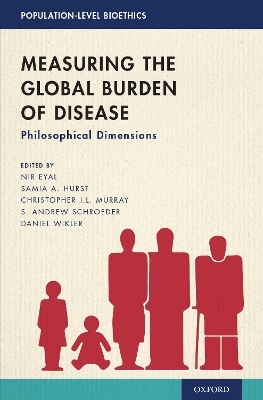
Measuring the Global Burden of Disease
Oxford University Press Inc (Verlag)
978-0-19-008254-3 (ISBN)
A study like the GBD is, of course, extremely complex from an empirical perspective. But it also raises a large number of complex ethical and philosophical questions that have been explored in a series of collaborations over the past twenty years among epidemiologists, philosophers, economists, and policy scholars. The essays in this volume address issues of current and urgent concern to the GBD and other epidemiological studies, including rival understandings of causation, the aggregation of complex health data, temporal discounting, age-weighting, and the valuation of health states. The volume concludes with a set of chapters discussing how epidemiological data should and should not be used.
Better appreciating the philosophical dimensions of a study like the GBD can make possible a more sophisticated interpretation of its results, and it can improve epidemiological studies in the future, so that they are better suited to produce results that can help us to improve global health.
Nir Eyal is the inaugural Henry Rutgers Professor of Bioethics in Rutgers University's department of philosophy and the Rutgers school of public health's department of health behavior, society and policy, as well as the founder and director of the Rutgers Center for Population-Level Bioethics. He is writing, among other things, on egalitarianism, consequentialism, health resource rationing, and ethical issues in the delivery of care in resource-poor settings. Samia Hurst is a physician bioethicist, ethics consultant, and professor of Bioethics at Geneva University's medical school in Switzerland, where she chairs the Institute for Ethics, History, and the Humanities, and the Department of Community Health and Medicine. She is a member of the Senate at the Swiss Academy of Medical Sciences and of the Swiss National Advisory Commission on Biomedical Ethics. Her research focuses on fairness in clinical practice and the protection of vulnerable persons. Christopher Murray is the Chair and Professor of Health Metrics Sciences and Director of the Institute for Health Metrics and Evaluation (IHME) at the University of Washington. He is a founder of the Global Burden of Disease approach, co-authoring the original study in the 1990s and bringing it to IHME in 2007. From 1998-2003 he served as the Executive Director of the Evidence and Information for Policy Cluster at the WHO. Andrew Schroeder is an associate professor of philosophy at Claremont McKenna College. His research covers topics in ethics, political philosophy, and the philosophy of science--especially questions that lie at the intersection of those fields. Daniel Wikler is Mary B. Saltonstall Professor of Ethics and Population Health in the Department of Global Health at the Harvard T.C. Chan School of Public Health. He earlier served as the World Health Organization's first "staff ethicist", working alongside Global Burden of Disease staff. His publications over four decades address ethical dimensions of population and global health, including health inequalities, the attribution of responsibility for health, priority-setting in health systems, and explorations of ethical issues arising in a number of fields of health research and practice.
Part I: Background and Basics
1. Introduction: Philosophy and the Global Burden of Disease Study - N. Eyal, S. Hurst, C.J.L. Murray, S.A. Schroeder, D. Wikler
2. GBD: the basics - T. Vos
3. Ethical Dimensions of the Global Burden of Disease - C.J.L. Murray, S.A. Schroeder
Part II: Measuring Health, Valuing Health
4. Can Health Be Measured? - D. Hausman
5. Health Can Be Measured: Weighing Disability in the Global Burden of Disease - J. Salomon
6. Does GBD 2010 Succeed in Measuring Health? - D. Hausman
7. Extended Preference and the Valuation of Health - M.D. Adler
8. Equivalent Income and the Well-Being Burden of Disease - E. Schokkaert
9. Years of Good Life Based on Consumption and Health: A Practical Wellbeing Metric for Economic Evaluation - R. Cookson, O. Cotton-Barratt, M. Adler, M. Asaria, T. Ord
10. Values, Politics, and Health-Measurement - E. Kingma
Part III: Causation
11. Causal Attribution, Counterfactuals, and Disease Interventions - J. Woodward
12. Causal Contribution - N. Hall
Part IV: Values and Measures of Health
13. To Discount or Not to Discount? - M. Fleurbaey, S. Zuber
14. Discounting for Uncertainty in Health - O. Cotton-Barratt
15. Age and Time in the Measurement of the Burden of Disease - G. Bognar
Part V: Uses of GBD Data
16. Healthy Nails versus Long Lives: An Analysis of a Dutch Priority-Setting Proposal - A. Voorhoeve
17. The Uses of Burden of Disease Data for Priority Setting - T. Ottersen, O.F. Norheim
18. The Global Health Impact Index - N. Hassoun
| Erscheinungsdatum | 12.06.2020 |
|---|---|
| Reihe/Serie | Population-Level Bioethics |
| Verlagsort | New York |
| Sprache | englisch |
| Maße | 236 x 163 mm |
| Gewicht | 635 g |
| Themenwelt | Medizin / Pharmazie ► Medizinische Fachgebiete ► Medizinethik |
| Studium ► Querschnittsbereiche ► Epidemiologie / Med. Biometrie | |
| Studium ► Querschnittsbereiche ► Geschichte / Ethik der Medizin | |
| Studium ► Querschnittsbereiche ► Prävention / Gesundheitsförderung | |
| ISBN-10 | 0-19-008254-2 / 0190082542 |
| ISBN-13 | 978-0-19-008254-3 / 9780190082543 |
| Zustand | Neuware |
| Informationen gemäß Produktsicherheitsverordnung (GPSR) | |
| Haben Sie eine Frage zum Produkt? |
aus dem Bereich


